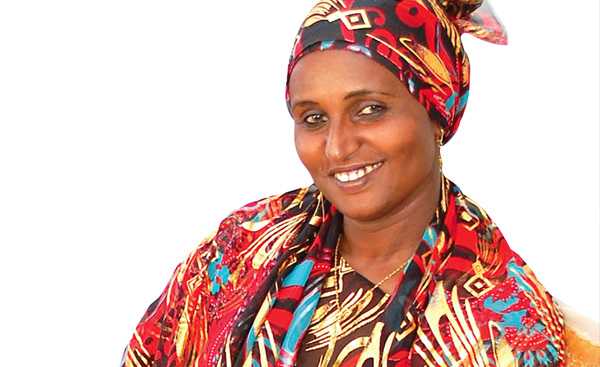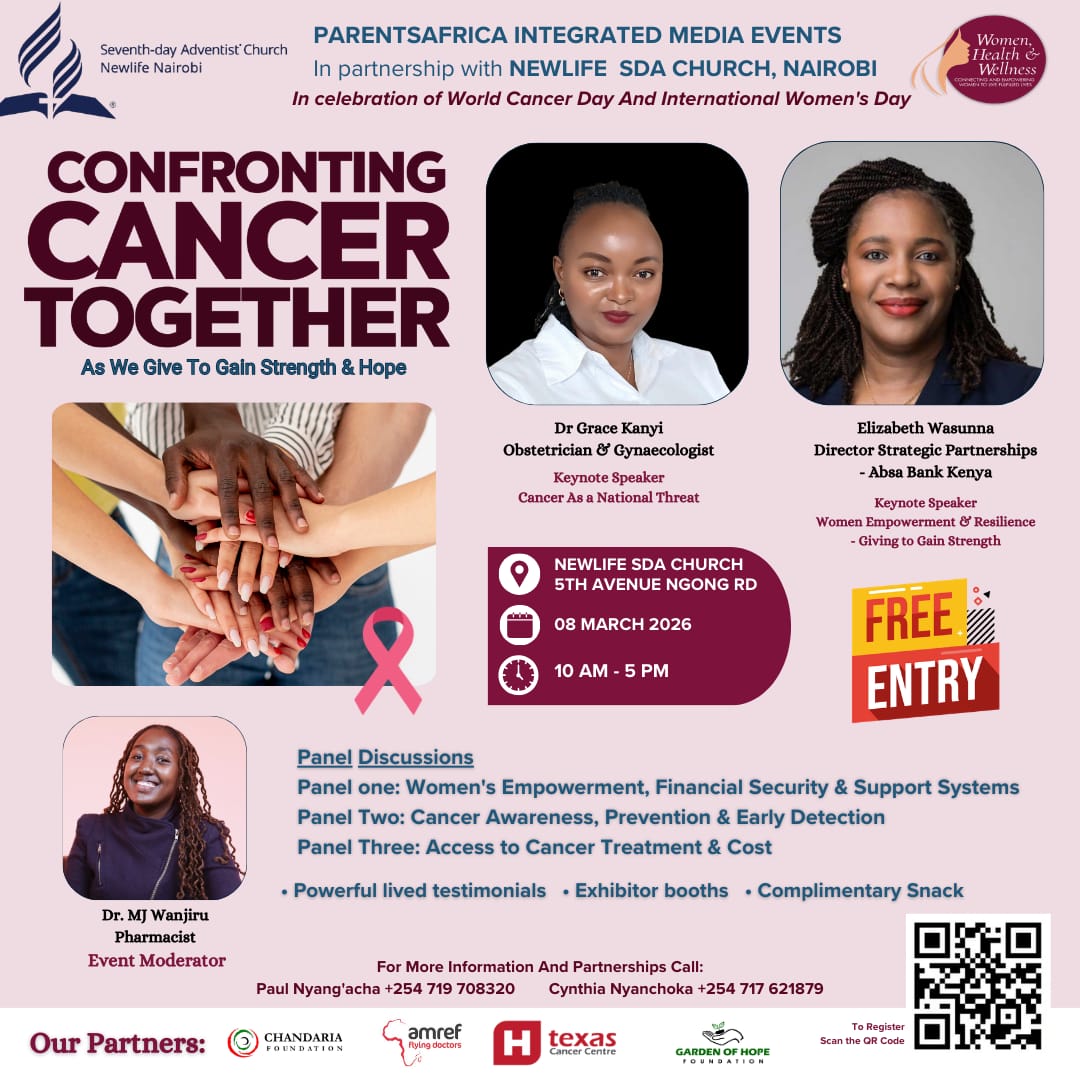NURIA SAID OMAR: Bringing Hope to Marsabit Women
It is estimated that 1.6 million Kenyans have been infected by the HIV and AIDs epidemic, making Kenya among the top four countries in Africa that have the highest number

It is estimated that 1.6 million Kenyans have been infected by the HIV and AIDs epidemic, making Kenya among the top four countries in Africa that have the highest number of infected persons. Concerted efforts by both the government and non-governmental organisations to fight stigmatisation and to improve the lives of those infected are commendable. However, there are still many who suffer in silence especially in rural areas. Nuria Said Omar has devoted her life to ease the burden of women and children affected or infected in Marsabit. She shares her experience with MWAURA MUIGANA.
Nuria sits back and looks at me with searching eyes at the opening of this interview. It is said that the eyes are the windows to the heart; only that this time, not even her eyes can divulge what a big heart she has. She is from Nagayo location in Marsabit County and a mother of eight children. And no, she is not HIV positive.
Nuria goes back in time to 2006. She recalls noticing a group of 23 women in her Manyatta village often sitting and discussing issues every day. One morning, she penetrated the group. The 23 were mothers widowed by the HIV and AIDS scourge or living with the virus. They did a noble job of taking care of HIV infected and affected children and women in the Manyatta village.
What endeared Nuria to these women was their zeal to help AIDS orphans not only with food, but also with education. They also took care of the bed-ridden women suffering from AIDS under Huruma Orphans and Vulnerable Children Care Givers Self Help Group. They contributed Ksh 50 per person per week. Every time she passed by the group, the urge to be part of them and give a hand was irresistible.
Nuria didn’t see them one morning and what she learnt was appalling. The official they had entrusted with their bank accounts had taken advantage of their illiteracy and stolen all their savings amounting to Ksh 300,000! Needless to say, the group collapsed. They lost hope and remained dormant for the next seven months.
The revival…
Nuria was disheartened and desired to restore the group. She had never been a member of a group and had little knowledge of their group dynamics. But that didn’t discourage her. She reckoned the many local NGOs could be approached for assistance. She made contacts with an official of APHIA Plus an AMREF Project. They discussed the fate of the women, their vulnerable families and the orphans they assisted. They mooted plans to give a kiss of life to the dying group.
Nuria did proposals to various local NGOs for assistance. She called the women for a meeting, inspired them and promised to do her best to bring them together to continue with their good work. They were very excited and asked Nuria to watch over them by doing the records, monitoring and evaluation.
She had to convince her husband why she needed to work with AIDS widows when she wasn’t one of them mainly because of the stigma then attached to HIV and AIDS. She was raving to begin and didn’t have to wait for response from the NGOs. She started a fund with each member contributing Ksh 50 per month and opened a bank account. She started proper bookkeeping and involved two officials to operate the bank account jointly with her for accountability.
APHIA Plus offered to train some of the group members to become Orphans and Vulnerable Children (OVC) caregivers to help in the management of HIV and AIDS. The organisation has clinics that provide free drugs to people living with HIV and AIDS. Nuria also took up the training. Apart from book keeping and coordinating the group’s activities, she started going out to impart the knowledge gained to members and the community. She convinced all group members to go through VCT to understand their status.
Those who were infected were taught how to manage and live positively with the virus. She partnered with the NGO to offer drugs and health services in the management of the condition. They were referred to the clinics for drugs on a regular basis. The caregivers visited those living with HIV and Aids in their homes regularly and gave appropriate advice on the right diet, hygiene and management of the condition. They would also pick drugs for them from the clinic when they were bed-ridden or initially too shy to pick for themselves. This is what they do up to now.
Apart from the HIV and AIDs pandemic, the group was also concerned with other issues that affected the Manyatta residents. Most people, for instance, never used treated water and consequently suffered from water-borne diseases. Nuria approached a local NGO to train caregivers on proper hygiene to impart the education to group members and the local community. They were trained in simple and inexpensive methods of cleaning and purifying water. The challenge of diarrhoea was consequently eliminated, according to Nuria.
Another major concern for the group members was the rampant drug abuse among children and youth. They approached a local NGO that trained all the group members. They then went out to (and still do) create awareness on the dangers of drugs and how to stop the vice in schools, colleges and other youth focus areas, and also in public barazas. Through this concerted effort, four schools in Marsabit County today lead in discipline and academic performance.
Income generating activities
The members realised that apart from their monthly contribution that went into assisting orphans especially in their education and providing food for the most vulnerable, they needed to engage in income generating projects. This would not only help the individual group members, but also families to get out of the handout mentality.
They settled for livestock farming but because of various challenges, changed tact and opted for the less-demanding but highly profitable poultry farming. They were trained and provided with an initial six high-breed chickens. Soon, these increased to 32 and currently poultry farming is one of the most successful income-generating projects for the group and individual families. They have many high breed chicken and members supply eggs to individuals and institutions. The benefit has spilled over to the community who now rear high breed chicken.
Farming in the arid area
With the growth of the group both in numbers and activities, they expanded to crop farming to counter hunger, a predicament in the area. Scarcity of water and land were major challenges. However, Nuria introduced kitchen gardening. Using gunny bags to store soil, they planted vegetables and tomatoes with commendable success. It required very little work yet fed families that previously relied on handouts.
Later, an NGO boosted them with seeds and chemicals and they embarked on serious farming. They sold the surplus and eventually managed to buy a piece of land for irrigation farming. They spent Ksh 800 daily on buying water for the crops. They came up with a duty roster with four members ensuring the crops were watered daily.
The expenditure was quite high and some members opted to draw from far off public water points instead of spending Ksh 50 for one jerry can of water. Each person had to draw four jerry cans when on duty or buy water for Ksh 200 from their pockets.
Three months into this project, a local NGO, Food For The Hungry, provided them with two 10,000-litre water tanks to harvest rainwater for irrigation. That was a game-changer for the group. They laid a water pipe from the tanks to supply to the farm. They currently grow spinach, cabbages and tomatoes among others for consumption and sale.
Silk self-help group
The members further expanded their activities and started a silkworm-rearing project. Silkworm rearing is an extensive month-long exercise for the production of silk. Silkworm larvae are fed on mulberry leaves and after they grow, the worm crawls up a twig placed near them and spins their silken cocoons. The silk is used for thread or yarn.
Silkworm rearing isn’t as easy as it sounds but the members have been determined. It involves various activities like harvesting of mulberry leaves, food preparation, feeding, bed cleaning and feeding the worms four times a day. Leaves are first washed with plain running water and then treated with a mild disinfectant. After adequate drying they are fed to silkworms.
Members of the Silk Rearing Self Help Group each contribute Ksh 300 a month, save part of it and put the rest in silkworm rearing. The group also operates a revolving fund to assist members undertake personal projects. The community has also taken up silk rearing inspired by the group’s success.
Rounding it off…
The group, with 200 active members, has managed to have considerable savings in the bank. To assist individual members, they have a merry-go-round. Every weekend, they visit one member and give the household Ksh 5,500 or alternatively buy them household items. They have made proposals for funds from the government’s Uwezo Fund and other sources.
“The monthly contributions for members are often used to pay school fees for secondary school orphans who currently number 22. Some NGOs also assist in paying school fees for some of the 100 plus orphans in primary schools. When a situation demands, I approach head teachers with a request not to chase away orphans who haven’t cleared fees,” Nuria gives an insight on the contributions.
Illiteracy, which in the first place almost fizzled out the group, is still a major challenge. The group has therefore acquired the services of an adult education teacher. The illiterate members have started classes and are on their road to literacy.
mwaura@parents.co.ke
Published in January 2015




